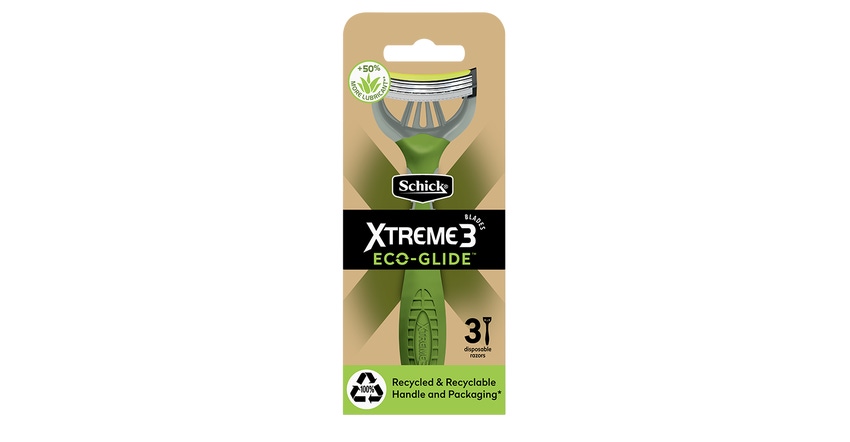A Close Shave with Sustainability
Schick introduced today the first mass-market disposable razor made with 100% post-consumer recycled plastic. It is also the only fully recyclable razor and packaging on the market.
March 16, 2021

Schick announced today the introduction of the Xtreme 3 Eco Glide, the first disposable razor on the mass market to be made with 100% post-consumer recycled (PCR) plastic. It is also the first and only razor on the mass market that is fully recyclable — razor and packaging, Schick claims.
With more than two billion disposable razors winding up in landfills each year, Schick recognized the time for bold change is now, said the company. This is just one example of the work Schick is doing to deliver on Edgewell Personal Care’s Sustainable 2030 Report to reduce plastic waste across the category. Edgewell (Shelton, CT) has a global portfolio of men’s and women’s disposable razors — including the Schick Xtreme 3. Edgewell also launched its new US program on March 9, 2021, to encourage the recycling of its disposable razors and to provide an alternative to curbside recycling programs, which typically do not accept razors.
As of January 2021, all of Xtreme’s razor handles, including Xtreme 3 Sensitive, Xtreme 3 DuoComfort, Xtreme 4 Outlast, and Xtreme 5 Precision Trim, are made with recycled materials, said a spokesperson for Schick responding to questions from PlasticsToday. “We are also minimizing plastic usage in our packaging bags,” said the spokesperson.
Used Schick Xtreme 3 razors will be recycled through a third party by registering on Schick’s website, where consumers can click on Get My Free Label to download a prepaid UPS shipping label. Consumers can use any empty cardboard box in which to collect the used razors to send to Schick.
Schick’s spokesperson explained that once the company has collected a large enough volume of razors and razor packaging, the items are sent to a well-known third-party, where the razors will be cleaned and sterilized to remove any residue such as shaving cream or hair. The razors and packaging are broken down and separated by material, such as the different types of plastics and rubber of the handles, and cartridges and metal blades. The metals are separated by magnets or eddy currents, and the plastic materials are separated via a combination of techniques, including sink/float and optical sortation. Metals are smelted and converted into alloys; the plastics and elastomers are turned into pellets, flakes, or powder that can be sold as raw material for production. The recycled plastics will then be used by processors to make new products and packaging.
“As a global leader in the personal-care category, with respected household brands and products that our consumers use every day, we have a responsibility to minimize our environmental footprint,” said Anne-Sophie Gaget, Chief Growth Officer, Edgewell. “We are committed to using our brands as a force for good so that they may have a positive impact on society and our environment, and I am encouraged by the progress we’ve made so far. The recycling program and use of PCR plastic in our disposables is a milestone in our sustainability journey.”
About the Author(s)
You May Also Like




